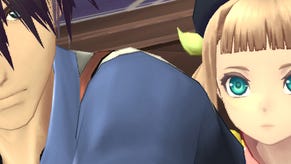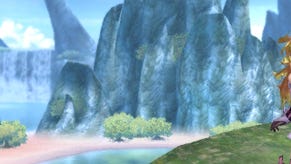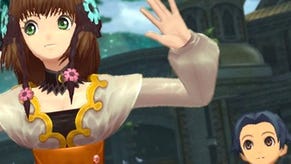Tales of Xillia 2 Review: Reduce, Reuse, Recycle
With its focus on the relentless regurgitation of content, Bandai Namco's latest RPG proves it's easy being green.
This article first appeared on USgamer, a partner publication of VG247. Some content, such as this article, has been migrated to VG247 for posterity after USgamer's closure - but it has not been edited or further vetted by the VG247 team.
Even though games have only grown cheaper and easier to obtain over the passing decades, there still persists a belief that every RPG needs to span at least 50 hours.
Outliers like Crimson Shroud, Costume Quest, and Child of Light have emerged in recent years to disprove this wrong-headed theory, but still, developers somehow feel obligated to have their RPGs meet this arbitrary criteria, lest they blaspheme an entire genre.
Tales of Xillia 2 suffers from this identity crisis. Even a huge publisher like Bandai-Namco doesn't have the resources to scrape together an entirely new installment each year, yet the series has become an annual event for its fanbase—an audience who presumably demands each sequel be just as long as the last. If Xillia 2 parceled out its content over the course of 20 hours, it wouldn't feel quite so desperate. Instead, it stoops to historic lows, buying time at every opportunity before revealing anything new.
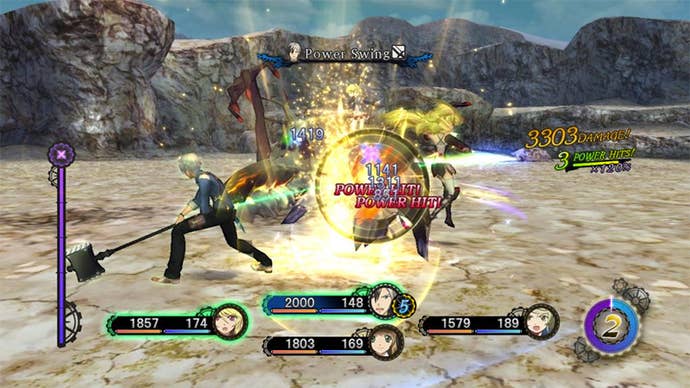
This reluctance wouldn't seem so flagrant, of course, if the game's plot wasn't engineered to deliver excessive padding. Due to events at the beginning of Xillia 2, protagonist Ludger Kresnik finds himself several million in debt to the corporation seemingly in control of everything on the planet. This problem of Ludger's doesn't only serve to kick the story into motion—it also sets up a system which gates your progress. Those with bad credit have limitations placed on their travel, so an early plot point involves accumulating enough cash to make a payment, simply for the sake of moving on to the next town. Unfortunately, this bit of world-building doesn't seem to affect anyone other than your character, outside of a few throwaway comments from NPCs. The concept of a society suffering under the burden of mandatory economic stability could lead to some interesting avenues, but Xillia 2 wastes this opportunity completely, making the presence of the payment system feel absolutely artificial as a result.
At first, though, it doesn't seem all that bad. Xillia 2 provides plenty of quests to undergo for the sake of funding your coffers, and the large maps connecting centers of population hold plenty of resources, treasure, and monsters to fight. In the early stages of the game, the gating of progress feels natural: Simply doing any area's given quests usually provides enough money to make the next payment. I ended up getting lost during a few hours of aimless exploring, so I naturally assumed the money earned through random battles and resource-gathering would easily take care of the next few installments.
After making it to the next story bit, Xillia 2 gave me my next goal: I had to make a payment on my debt before the plot could continue chugging along. It was then I noticed this new amount was six figures in size, and all the old quests I'd completed before were back, waiting for me to undertake them again. Xillia 2 wasn't ready for me to move on until I killed another hour doing things I'd already done before.
And this reuse of content goes beyond Xillia 2's "paywall:" After a certain point in the game, Ludger is tasked with a primary mission that involves traveling to alternate dimensions and destroying the catalysts powering them. While this idea isn't inherently flawed, Xillia 2 uses it as a flimsy excuse to feed you old content in a ever-so-slightly-modified form. Remember that open field you spent the last 15 hours traipsing through? Well, now you have to go back there, except things are different colors—because it's an alternate dimension or something. Listen, you'll just have to take Xillia 2 on its word, since alternate takes on world so poorly defined might as well involve alternate hues and camera filters. Hill Valley this is not.
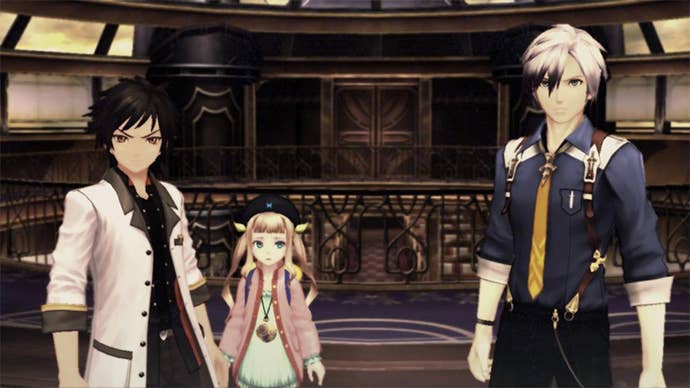
Xillia 2 could have been relatively painless if it didn't hold so much insecurity about its size. The story, while told through the medium of fluffy, trope-ridden anime, stays mostly inoffensive, even if the precocious child character loses a little something in the translation when she's played by a grown woman putting on a widdle baby voice. As always, the battle system remains Tales' biggest draw, and while it goes to great lengths to pretend it's full of nuance and choice, Xillia 2's combat is simple, button-mashing fun. In fact, the snappiness of the battle system only serves to throw the rest of the game's pacing in stark relief: When you jump in and out of a battle in less than ten seconds, you have to wonder how much better the experience could be if the rest of the game devoted the same respect to your time.
Ultimately, Tales of Xillia 2 is shameless. Beneath its light-hearted, anime-infused exterior beats a cold, calculating heart, bent on stretching the game's limited resources to their breaking point. And that's a shame, because Xillia 2 feels like one of the most modern takes on the series to date—it's clear RPG developers have learned a lot from the breakout success of the Persona series. But this modernization comes with some significant downsides: At its worst, Xillia 2 feels like a predatory free-to-play game, where you're simply waiting for a timer to expire before it permits you to have any fun. With the series' annualization, this approach might be the only way to make these games possible—but it certainly doesn't make them much fun.
VisualsColorful and gorgeous. After several iterations during the PS3 generation, Bandai-Namco really has a grasp on making these 2D character designs into convincing 3D models.
SoundUnlike the bombast of past Tales' soundtracks, Xillia 2's is a lighter, jazzier affair. It's pleasant, but tends to get lost in the background.
InterfaceXillia 2 offers a wealth of options in combat, and while you never really have to experiment much, turning into a whirling dervish of death feels absolutely effortless.
Lasting AppealThere's a lot to do here. Unfortunately, most of it's served with a debilitating case of deja vu.
ConclusionThe Tales series definitely can't sustain annual installments, and Xillia 2 is proof. It's a 20-hour game in a 50-hour package, bloated to hell and back by a design engineered to recycle content. If you're interested in playing an installment of the Tales series, you deserve much better than this.

